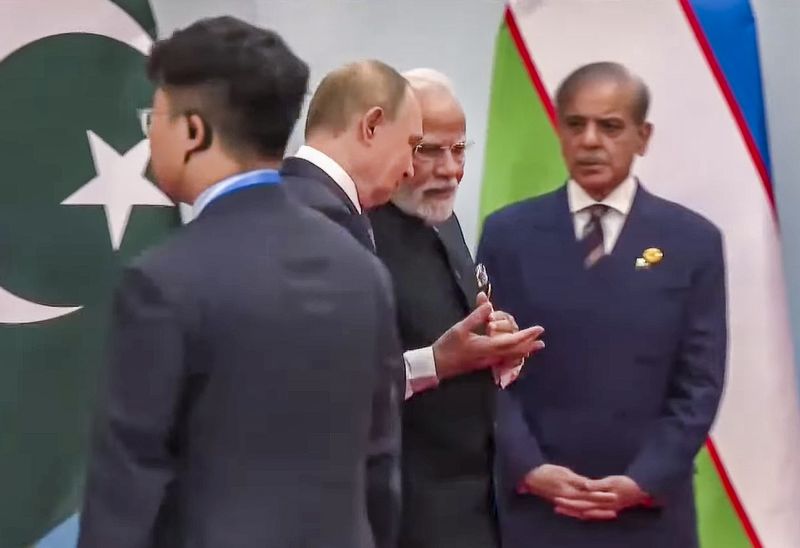This was the first time that Indian and Pakistani prime ministers were at the same table since the four-day military clash between their militaries in May.
New Delhi: Prime Minister Narendra Modi on Monday (September 1) cited the Pahalgam attack to question “open support” for terrorism at the Shanghai Cooperation Organisation (SCO) Summit, where the joint declaration for the first time named recent strikes in India and Pakistan in its condemnation of terror.
Speaking at the plenary in Tianjin, Modi said India had endured the “grave scars of ruthless terrorism” for four decades, leaving countless families devastated. Referring to the April 22 Pahalgam attack as the “most heinous face of terrorism”, he stated that it was not just an “assault on the conscience of India, but also an open challenge to every nation, and every individual who believes in humanity”.
“Can the open support for terrorism by certain countries ever be acceptable to us?” he asked, without taking names.
He described terrorism as a threat not only to individual nations but to “all of humanity.”
Modi pointed to India’s leadership of a SCO-RATS Joint Information Operation against Al-Qaeda and its affiliates this year and stressed New Delhi’s campaign against terror financing. “We have raised our voice firmly against terror financing, and I sincerely thank all of you for the support extended in this effort,” he said.
Pakistan’s Prime Minister Shehbaz Sharif, speaking in the same session, struck a different note. He said Pakistan “respects the sovereignty and integrity of all SCO members and its neighbours,” and underlined the importance of adhering to international and bilateral treaties – a likely reference to India’s suspension of the Indus Waters Treaty a day after the Pahalgam attack.
“Uninterrupted access to due share of water as per existing treaties among SCO members will strengthen the SCO working smoothly and will support the achievement of broader goals for which the SCO was established,” Sharif said. He reaffirmed that Pakistan sought “a normal and stable relationship with all its neighbours” and preferred “dialogue and diplomacy over conflict and confrontation.”
This was the first time that Indian and Pakistani prime ministers were at the same table since the four-day military clash between their militaries in May.
The Tianjin summit declaration, endorsed by all SCO members including India, largely followed the familiar template on terrorism language from past years.
But in a departure, it specifically named the Pahalgam attack of April 22 and the Jaffer Express and Khuzdar strikes in Pakistan in consecutive sentences. It went on to demand that “perpetrators, organisers and sponsors of such attacks must be brought to justice,” extending the call for accountability to both incidents.
Reiterating that double standards were “unacceptable,” the SCO called on the international community to combat terrorism “including cross-border movement of terrorists” under United Nations resolutions and strategies.
This phrasing was not new. The New Delhi Declaration of 2023 had pledged to “suppress recruitment activities and cross-border movement of terrorists, to counter extremism, and radicalization of youth,” while the 2024 Astana Declaration committed members to “resolutely combat the financing of terrorism, recruitment and cross-border movement of terrorists, radicalization of youth, as well as the use of new information and communications technologies for terrorist purposes.”
In June, India has blocked the release of a joint communique by the Shanghai Cooperation Organisation (SCO) defence minsters, claiming that it had not explicitly addressed New Delhi’s concerns on Pakistan-sponsored cross-border terrorism.
A day earlier, Indian foreign secretary Vikram Misri had told reporters that India had “received the understanding and cooperation of China as we have dealt with the issue of cross-border terrorism in the context of the ongoing SCO summit”.
He had also said that Modi had told Chinese President Xi Jinping that “both India and China” had to combat cross-border terrorism.
“As I said, he outlined the fact that this is a scourge that both China and India have been victims of, and India is still combating this menace. And he asked for China’s support on this particular issue,” he added.
Besides addressing terrorism, Modi outlined India’s approach to connectivity, citing projects such as the Chabahar Port and the International North-South Transport Corridor as crucial for ties with Afghanistan and Central Asia.
He emphasised that such initiatives “must uphold the principles of sovereignty and territorial integrity,” warning that “connectivity, that by-passes sovereignty, ultimately loses both trust and meaning.”
India again stood apart as the only SCO member not to endorse China’s Belt and Road Initiative in the declaration. Since joining as a full member in 2018, New Delhi has consistently withheld support for the BRI in joint SCO statements.
This article went live on September first, two thousand twenty five, at thirty-two minutes past six in the evening.
The Wire is now on WhatsApp. Follow our channel for sharp analysis and opinions on the latest developments.
